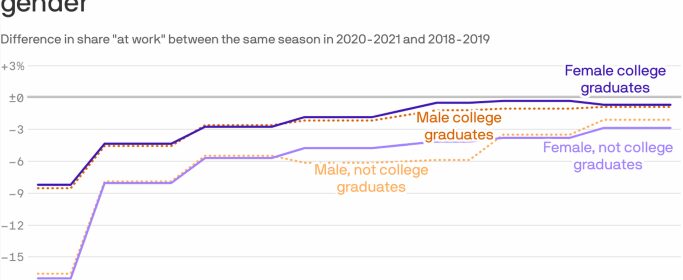Research: College-educated women did not leave labor force during pandemic

College-educated mothers were stressed and under extreme pressure at home and at work during the pandemic. But that didn't lead them to leave the job market in greater numbers than men, new research finds.
Why it matters: The findings, from Harvard economics professor Claudia Goldin, debunk one of the storylines that came out of the pandemic — the idea that droves of well-educated women left or would leave the labor force.
- “[Women] have been stressed, frustrated, and anxious because they did not leave their jobs,” Goldin writes in her paper.
- "There have been so many doomsday predictions, it's really important to go back to the data and see what actually happened," Jane Olmstead-Rumsey, an economist at the Federal Reserve Bank of Minneapolis, emphasized at a Brookings conference yesterday discussing the paper.
Yes, but: You can still call it a "she-cession." More women than men did drop out of the workforce during COVID — but they tended to be those with less education.
- Their reasons for leaving were less about caregiving and more about their ability to work remotely.
- Less-educated women were more likely to work in roles that couldn't be done from home, and to work in sectors more affected by COVID risks and regulations — retail, restaurants, etc.
- Women of color were also more likely to face health-related challenges that pushed them out of work, Goldin finds.
The backstory: Women's labor force participation rates were relatively stagnant from the 1990s up until right before the pandemic — when a surge of women entered the workforce, particularly the service sector, as the job market improved.
- That surge made the resulting job losses during COVID seem more dramatic, Goldin says.
- So, for her paper, she uses census data to compare the percentage of women at work during 2020-2021 to the percentage at work in the era before women's participation spiked.
The big picture: Until 2020, recessions always hit men harder than women, because of job losses in male-dominated industries like manufacturing and construction.
- But the 2020 recession was different in that it hurt female-dominated industries, like retail and hospitality.
What to watch: Though college-educated women kept their jobs by working remotely, they also took on more caregiving work at the same time. The question now is: What will that mean for their chances of advancement at work in the years to come?
- More work on this will undoubtedly shed light, Goldin said yesterday, "Terrible times lead to more research."
Source: Read Full Article